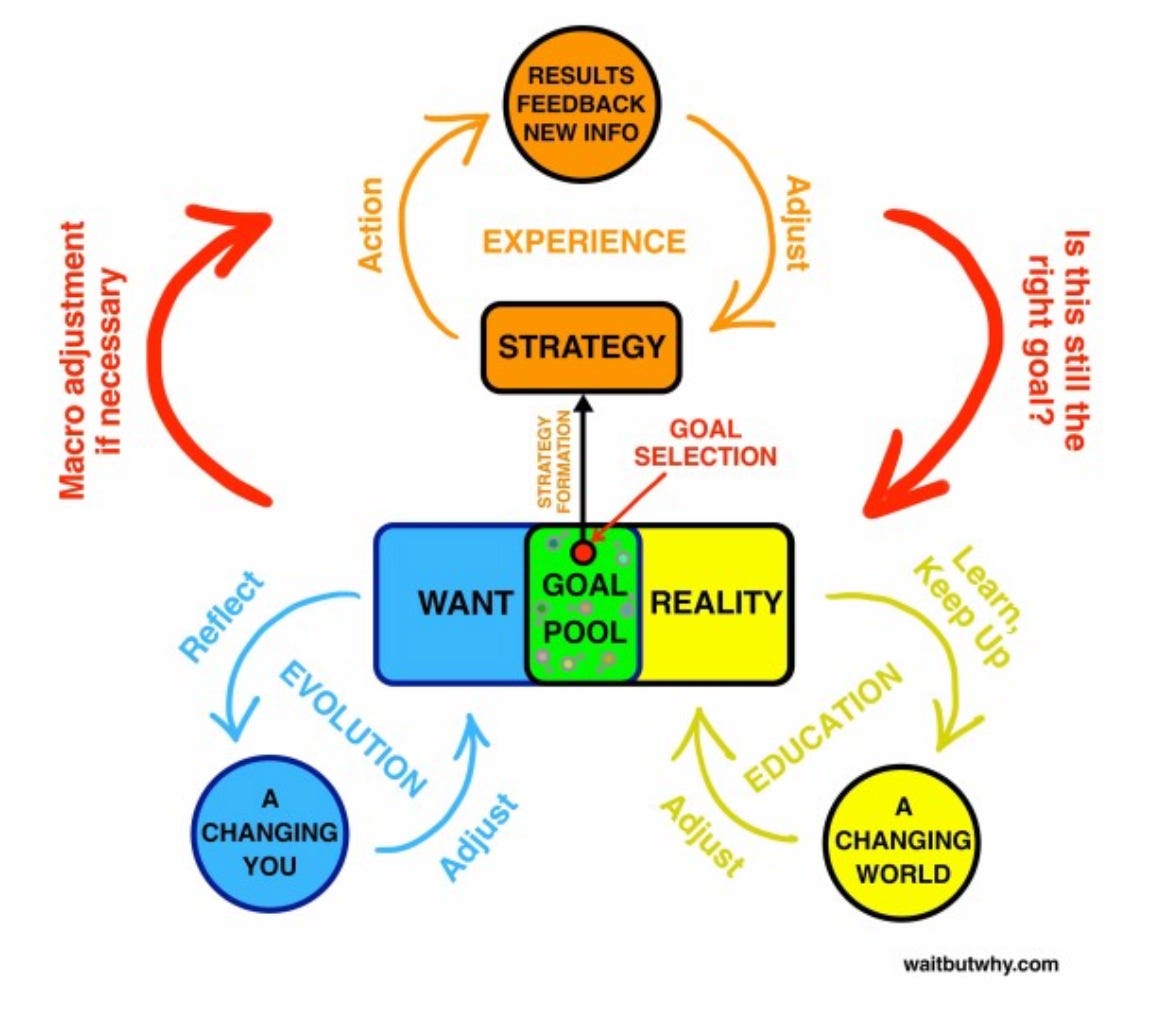The Status Game

Humans are competitive by nature. We are the products of billions of years of evolution, which is by definition a competitive process. We live in an era would seem like heaven on earth to humans as early as 200 years ago. Today humans on average are living the best lives they ever have. On virtually all of the key dimensions of human material well-being—poverty, literacy, health, freedom, and education—the world is an extraordinarily better place than it was just a couple of centuries ago. The world is less violent, more stable, and more prosperous than it has ever been. By almost any measure, the world is better than it has ever been.
Stephen Pinker wrote a fantastic description of how life has improved over the last four millenea for humans is written in Enlightenment Now: “A Babylonian in 1750 BCE would have had to labor fifty hours to spend one hour reading his cuneiform tablets by a sesame-oil lamp. In 1800, an Englishman had to toil for six hours to burn a tallow candle for an hour. (Imagine planning your family budget around that—you might settle for darkness.) In 1880, you’d need to work fifteen minutes to burn a kerosene lamp for an hour; in 1950, eight seconds for the same hour from an incandescent bulb; and in 1994, a half-second for the same hour from a compact fluorescent bulb—a 43,000-fold leap in affordability in two centuries."
In fact my favourite fact from that book was a focus on the economic transformation that Africa, Asia and South America went through in the 1990s and 2000s. Between 2003 and 2013 Kenyans life expectancy increased 10 years. Meaning that for someone who aged 10 years in that time they did not increase in their closeness to death. After living for a decade, mathematically, they hadn’t taken a single step closer to death! Most people generally think that one year age is one year closer to death. However in the 20th century the average increase in closeness to death per year was seven months due to the continuing increases in life expectancy.
Why do humans care about social status?
Anyway, while this is all very interesting, how does this relate to the status game and our attitude towards it? Well, despite the world becoming measurably better in almost all aspects, we are still human and have human desires. Our one biological purpose, according to our genes is to live, have as many children as possible then die. Tim Urban described this very well in his recent book what's our problem?. The animal world is "a world of trillions of strands of genetic information, each one hell-bent on immortality. Most gene strands don’t last very long, and those still on Earth today are the miracle outliers, such incredible survival specialists that they’re hundreds of millions of years old and counting. Animals are just a hack these outlier genes came up with—temporary containers designed to carry the genes and help them stay immortal".
Homo Sapiens as a species have been around for around 200,000 years and for the last 100,000 years have ben living in tribal scale societies. Social status within these societies was one of the main determining factors of who you would have children with. Therefore we have evolved to have the desire to have social status. Just in the same way we have evolved to find sex, food and social interaction enjoyable.
The things that give people social status over the years has changed drastically. Today we get status from money, Nobel Prizes, Olympic medals, holding political positions. Alain de Botton had a fantastic example how different cultures give different priorities value in his book Status Anxiety: In Brazil between 1600 and 1960 among the Cubeo tribe of the north-west Amazon, individuals with the highest status were men who were the most skilled at killing jaguars. A person who killed a jaguar would wear its teeth on a necklace. The more jaguars one killed, the more chance one had of becoming the ‘headman’ or tribal chief. Headmen wore large jaguar-tooth necklaces as well as an armadillo girdle. Men in these tribes would lament their lack of jaguar teeth would pray to the Gods that they be granted luck in their hunting.
The reason this is important is that while human happiness over the years has increased significantly as well, it is still a very common place issue for people to worry about their status. I certainly have had moments were I have had “status anxiety”. Its a common issue for humans to wish that certain aspects of their careers were going better, or that they had found more success in their life endeavours. It's also great to remind yourself that whenever you get worried about your social status, you could just as easily be worrying about the size of jaguar teeth you have on your neckless if you were born in a different time and place. It somewhat trivialises any status concerns you have in a very refreshing way.
Why do we want people to be ambitious?
I think that it is actually very important for people to be ambitious. It doesn't matter whether people working on important projects are mostly motivated by increasing their status or by the genuine desire to help others. If they are able to solving difficult problems that benefit others and improve people's lives that's a good thing. It just so happens that today what we have decided gets high status overlaps with what helps people. Of course this isn't always the case, lots of terrible human behaviour has been motivated by a desire for high status or power including wars and genocide. But on balance I think that a desire for high status has been a net beneficial trait for humanity.
As Ray Dalio wrote in Priciples for dealing with a changing world order, "the biggest thing affecting most people in most countries is deciding how they make, take, distribute and control power." This is a timeless fact and the empire game has been and will continue do be played between countries until the control of wealth and power is not needed, which realistically seems like it win never not be important.
John Mershimer, a professor of political science and international relations at The University of Chicago also pointed in a recent Podcast that a state’s number one priority is safety. In a world without a higher power between states you need to be as powerful as possible, power comes from economic prosperity, therefore you need a nation to have ambitious people in it developing new companies, technologies and competing within each other to spearhead a growing economy for a nation to secure itself adequately.
So we have established that ambition is necessary. The key now to keeping ourselves happy while being very ambitious is our personal attitude towards the status game and our mindset.
A process focused mindset
eing ambitious is great, but anyone who is ambitious is going to at some point get worried about how they stack up against others. Focusing on the right things as you try to have an impact in the world is important. Focusing on outcomes can be tricky because when luck is partly involved it can be difficult to have complete control over what happens. While obviously you want to see where all of your efforts are taking you in life, it can be very treacherous territory to fix your happiness in life to specific outcomes in projects. Thinking you’ll be happy when a certain career specific outcome happens is pretty circular thinking and you’re not likely to feel fully content even when you do achieve that outcome. To paraphrase Sam Harris from a recent Podcast appearance "at some point you have to fall in love with the process because the process is all there is".
Instead, you want to focus your attention on the process. It feels better to be thinking about the system you have set up and how you can ensure it is working effectively. This isn’t to say that you shouldn’t think about outcomes at all, there’s not much point to doing anything if it doesn’t have an outcome. Being aware of outcomes is absolutely fine but you want to think more about your process for getting things done. You’ll be focusing on actionable stuff that is within your control. If your system is well set up, it will take you where you want to go.
“Success if achieving what you set out to do” - Derek Sivers
This also ties into an exceptional post made by Tim Urban on the Wait But Why blog looking at Elon Musk's personal guiding software. His approach is to find an appropriate goal and to come up with a strategy to achieve that goal. Then constantly get feedback on how what you are doing is helping you achieve that goal. But the focus on on the process, the process is what gets you your outcomes so if you are going to spend brain power thinking about what to do, its best to think about your system rather than what that system has produced.
Overall you can look at the process focused mindset as a bit of a mental crutch to stop your ambition ruining your self esteem and as a bit of a productivity hack because your results are just a downstream of the processes you have.

You're happier being you than you think
The Almanack of Naval Ravikant was one of the best books I read in 2023. There was a fantastic paragraph that essentially eradicated any jealousy I had before reading it. I think about this paragraph whenever I get a hint of jealousy:
"Jealousy was a very hard emotion for me to overcome. When I was young, I had a lot of jealousy. By and by, I learned to get rid of it. It still crops up every now and then. It’s such a poisonous emotion because , at the end of the day, you’re no better off with jealousy. You’re unhappier, and the person you’re jealous of is still successful or good - looking or whatever they are. One day, I realised with all these people I was jealous of, I couldn’t just choose little aspects of their life. I couldn’t say I want his body, I want her money , I want his personality. You have to be that person . Do you want to actually be that person with all of their reactions , their desires, their family, their happiness level, their outlook on lif , their self - image? If you’re not willing to do a wholesale , 24 / 7, 100 percent swap with who that person is, then there is no point in being jealous. Once I came to that realisation, jealousy faded away because I don’t want to be anybody else. I’m perfectly happy being me. By the way, even that is under my control. To be happy being me. It’s just there are no social rewards for it"
After digesting that concept and really thinking about it. I realised I wouldn't want to swap places with anyone in the world (even Elon Musk - amazing career but turbulent personal life, reported multiple times that he's not massively happy a lot of the time). I love my family and friends and unique personal worldview, swapping would lose all of that. I think a higher proportion of people than one would expect would rather not swap their lives with anyone. Once you realise you wouldn't want to swap lives with anyone in the world you have no right to not be the happiest you can be with your life circumstances.
Thinking in little bets
Steve Jobs didn't have Apple entirely planned out from the beginning, he was going to be a Zen Buddhist. Condalica Rice was a classical musician before becoming the first black female US secretary of state. You don't have to have the entirety of your career planned out but can take sensible decisions that are going to get you in the direction you want to go.
For example, over the years while working as a doctor, I have become increasingly interested in AI and how it will change medicine. I have been chipping away at my computational skills over the last few years and finding appropriate projects for me to develop my skills and apply them in interesting way. I don't know exactly whether I will stay working as a doctor in the NHS who does academic research or whether I will look to take my skills into the commercial sector. The point is that I know that developing coding skills is a good move that will probably be valuble in the future regardless of which path I take. You don't have to start your career with a bold plan and making a heroic effort in that one direction. This "thinking in little bets" concept was a fantastic insight I got from a book called So Good They Can't Ignore You by Cal Newport.
Opting for small, incremental ventures is more advantageous, as they offer insights into your actions and facilitate progress. Engaging in these minor endeavors allows you to obtain crucial feedback, guiding your subsequent steps based on success or failure. This approach prevents investing excessive time in a potentially unsuccessful direction or one that fails to align with your ultimate objectives. By accumulating information gradually, you gain valuable insights that contribute to incremental advancements toward your goal.
How will you measure your life?
Zooming out to the big picture, when you are evaluating your life in its entirety, your career isn’t going to be the first thing that comes to mind. Whether you are Bill Gates or living below the poverty line, it will be your relationships with your family and friends and the experiences you have with them that you value most in life. I remember being at home with my partner lying on the sofa just being goofy and thinking “even if I were a billionaire this is one of the best parts of life”. Yes your career will come into it too but for its not the most important thing in your life when compared to good quality relationships with your family and friends (it’s probably the second most important after those).
Quote
"Men do not desire merely to be rich, but to be richer than other men." - John Stuart Mill, Essay on Social Freedom
Favourites of the week
- Book
- Elon Musk by Walter Isaacson
- I firmly belive that Elon Musk is the most valuble asset humanity has to ensuring a positive future for humanity. The exceptional new biography of him by Walter Isaacson was an amazing insight. Bill Gates said “there is no one in our time who has done more to push the bounds of science and innovation than he has.”
- Elon Musk by Walter Isaacson
- Podcasts
- Sam Harris on the Modern Wisdom Podcast
- includes more detail on the "the process is all there is" alongside other great discussions around Andrew Tate, Andrew Huberman and Jordan Peterson, whether society has reached peak woke, Sam’s take on young Western men converting to Islam and much more.
- John Mersheimer on the Lex Fridman Podcast
- A very well informed expert talking about current geopolitics. Lots on the potential US-China war over Taiwan and the Israel palestine conflict.
- Sam Harris on the Modern Wisdom Podcast
